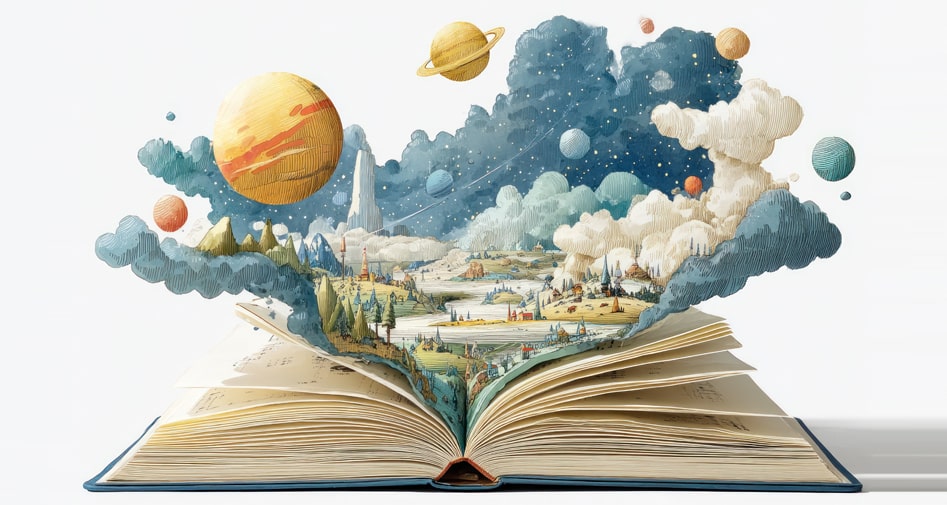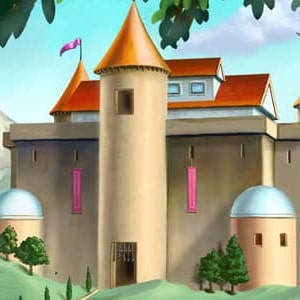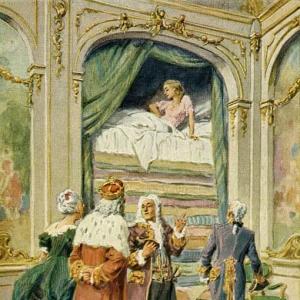Reading time: 13 min
Great-Grandfather was so lovable, wise and good. All of us looked up to Great-Grandfather. As far back as I can remember, he was really called „Father’s Father,“ and „Mother’s Father“ as well, but when my Brother Frederick’s little son came along he was promoted, and got the title of „Great-Grandfather.“ He could not expect to go any higher than that.
He was very fond of us all, but he did not appear to be fond of our times. „Old times were the good times,“ he used to say. „Quiet and genuine they were. In these days there’s too much hurrying and turning everything upside down. The young folk lay down the law, and even speak about the Kings as if they are their equals. Any ne’er-do-well can sop a rag in dirty water and wring it out over the head of an honorable man.“
Great-Grandfather would get angry and red in the face when he talked of such things, but soon he would smile his kindly, sympathetic smile, and say, „Oh, well! I may be a bit wrong. I belong to the old days, and I can’t quite get a foothold in the new. May God guide us and show us the right way to go.“ When Great-Grandfather got started on the old days, it seemed to me as if they came back.
I would imagine myself riding along in a gilded coach, with footmen in fine livery. I saw the guilds move their signs and march in procession with their banners aloft, preceded by music. And I attended the merry Christmas festivities, where people in fancy dress played games of forfeit. True enough, in the old days dreadfully cruel and horrible things used to be done. There was torture, rack and wheel, and bloodshed, but even these horrible things had an excitement about them that fascinated me.
But I also thought of many pleasant things. I used to imagine how things were when the Danish nobility freed the peasants, and when the Danish Crown Prince abolished slave trading. It was marvelous to hear Great-Grandfather talk of all these things, and to hear him tell of the days of his youth. But I think the times even earlier than that were the very best times of all – so mighty and glorious.
„They were barbarous times,“ Brother Frederick said. „Thank heaven we are well rid of them.“ He used to say this right out to Great-Grandfather. This was most improper, I know, but just the same I always had great respect for Frederick. He was my oldest brother, and he used to say he was old enough to be my father – but then he was always saying the oddest things.
He had graduated with the highest honors, and was so quick and clever in his work at Father’s office that Father meant to make him a partner before long. Of us all, he was the one with whom Great-Grandfather talked most, but they always began to argue, for they did not get along well together. They did not understand each other, those two, and the family said they never would, but even as young as I was, I soon felt that they were indispensable to each other.
Great-Grandfather would listen with the brightest look in his eyes while Frederick spoke of or read aloud about scientific progress, and new discoveries in the laws of nature, and about all the other marvels of our times. „The human race gets cleverer, but it doesn’t get better,“ Great-Grandfather would say. „People invent the most terrible and harmful weapons with which to kill and injure each other.“
„Then the war will be over that much sooner,“ Frederick would tell him. „No need now for us to wait seven years for the blessings of peace. The world is full-blooded, and it needs to be bled now and then. That is a necessity.“ One day Frederick told him of something that actually happened in a small country and in our own times. The mayor’s clock – the large one on the town hall – kept time for the whole town and for everyone who lived there.
The clock did not run very well, but that didn’t matter nor did it keep anyone from looking to it for the time. But by and by railroads were built in that country, and in all countries railroads run by the clock. One must therefore be sure of the time, and know it exactly, or there will be collisions. At the railroad station they had a clock that was absolutely reliable, and exactly in accord with the sun. But as the mayor’s was not, everyone went by the railroad clock.
I laughed, and thought the story a funny one, but Great-Grandfather did not laugh. He became very serious. „There is a profound meaning in what you have told me,“ he declared, „and I understood the thought that prompted you to tell me the story. There’s a moral in the clockwork. It reminds me of another clock – my parents‘ simple, old-fashioned Bornholm clock, with lead weights. It measured out the time of their lives and of my childhood.
Perhaps it didn’t run any too well, but it ran just the same. We would look at the hour hand and believe in it, with never a thought about the works inside. In those days the machinery of government was like that old clock. Everybody believed in it and only looked at the hour hand. Now government machinery is like a clock in a glass case, so that one can look directly into the works and see the wheels turning and whizzing around.
Sometimes we become quite frightened over this spring or that wheel, and then I wonder how it is possible for all these complicated parts to tell the right time. I have lost my childish belief in the rightness of the old clock. That is the weakness of this age.“ Great-Grandfather would talk on until he became quite angry. He and Frederick could not agree, yet they could not bear to be separated – „just like old times and new.“ Both of them felt this – and so did our whole family – when Frederick was to set out on his journey to far-away America.
It was on business for the Company, so the journey had to be made. To Great-Grandfather, it was a sad parting, and it seemed a long, long journey – all the way across a great ocean, and to the other side of the globe. „You shall get a letter from me every fortnight,“ Frederick promised. „And faster than any letter can go, you shall hear from me by telegraph. The days will be like hours, and the hours like minutes.“
By telegraph we received Frederick’s greeting to us from England, just as he boarded the steamship. Sooner than any letter could reach us, even though the swift sailing clouds had been our postman, came greetings from America, where Frederick had landed only a few hours before. „What a glorious and divine inspiration has been granted our age,“ said Great-Grandfather. „It is a true blessing to the human race.“
„And it was in our country,“ I said, „that the natural principle underlying the telegraph was first understood and stated. Frederick told me so.“ – „Yes,“ Great-Grandfather said, and he kissed me. „Yes, and I once looked into the kindly eyes that were the first to see and understand this marvelous law of nature – his were the eyes of a child, like yours – and I have shaken his hand.“ Then he kissed me again.
More than a month had gone by, when a letter came from Frederick with the news that he was engaged to a beautiful and lovable young lady. He was sure that everyone in our family would be delighted with her, and he sent us her photograph. We looked at it first with our bare eyes, and then with a magnifying glass, for the advantage of photographs is not only that they stand close inspection through the strongest glass, but that then you see the full likeness even better.
No painter has ever been able to do that, even in the greatest of the ages past. „If only this discovery had been made earlier, then we could have seen the world’s greatest and most illustrious men, face to face. How gentle and good this young girl looks,“ Great-Grandfather said, and stared through the glass. „Now I know her face, and I shall recognize her the moment she comes in the door.“
But that very nearly failed to happen. Fortunately, at home we did not hear of the danger until it had passed. After a safe and pleasant trip, the young couple reached England. From there, they were to come by steamship to Copenhagen. When they came in sight of the Danish coast- the white sand dunes along the western shore of Jutland – a heavy sea arose and dashed the ship against the shore. The enormous waves threatened to break the grounded ship in pieces.
No lifeboat could reach them. Night fell, but out of the darkness burst a brightly flashing rocket from the shore. It shot far out over the grounded ship, and brought a line to those on board. Once this connection between ship and shore was made fast, a rescue buoy was carefully drawn through the rough, tumultuous sea, to the shore. In it was a lovely young woman, safe and sound, and marvelously happy when she and her young husband again stood together on the shore. Every soul on board was saved before the break of day.
Here in Copenhagen we were sound asleep, dreaming neither of grief nor of danger. When we were gathered at the breakfast table, we heard a rumor that an English steamship had been wrecked on the west coast. We grew heartsick with anxiety, but within an hour we received a telegram from those who were dear to us. Frederick and his young bride were saved – they would soon be with us.
Everyone cried, and I cried too. Great-Grandfather cried and clasped his hands. I am sure he gave thanks for the age in which we live, for that very day he gave two hundred dollars toward raising a monument to Hans Christian Oersted. When Frederick came home with his bride, and heard of it, he said, „That was right, Great-Grandfather. Now let me read to you what Oersted wrote, a great many years ago, about the old times and the new.“
 Learn languages. Double-tap on a word.Learn languages in context with Childstories.org and Deepl.com.
Learn languages. Double-tap on a word.Learn languages in context with Childstories.org and Deepl.com.Backgrounds
Interpretations
Adaptions
Summary
Linguistics
„Great-Grandfather“ is a fairy tale written by Hans Christian Andersen, a Danish author known for his children’s stories, including classics like „The Little Mermaid,“ „The Ugly Duckling,“ and „The Snow Queen.“ Born in 1805 in Odense, Denmark, Andersen’s writings have been translated into more than 125 languages and have become an integral part of children’s literature worldwide.
Andersen’s stories often include elements of fantasy, morality, and real-life experiences. His tales have been adapted into numerous plays, films, and animated features over the years. Although primarily known for his fairy tales, Andersen also wrote plays, travelogues, novels, and poems. „Great-Grandfather“ is a lesser-known fairy tale by Hans Christian Andersen. The story revolves around themes of aging, mortality, and the passage of time. Although not as famous as some of Andersen’s other works, it provides a unique look into the author’s thoughts on the human experience and the fleeting nature of life.
„Great-Grandfather“ was first published in 1865 as part of a collection of Andersen’s fairy tales. This story reflects the theme of embracing change and progress, as well as the importance of understanding and appreciating different perspectives within a family or society. The tale also highlights the power of innovation, the significance of communication between generations, and the enduring human spirit.
As a background, Andersen was deeply influenced by the Romanticism movement of the time, which emphasized the importance of individual emotions, imagination, and the power of nature. His fairy tales often reflect these themes, and „Great-Grandfather“ is no exception. The story explores the role of time and the natural cycle of life, as the great-grandfather clock represents the passage of time, as well as the connection between past, present, and future generations. The tale also touches upon the inevitability of aging and the acceptance of mortality, which are common themes in Andersen’s work.
„Great-Grandfather“ can be interpreted in several ways.
Embracing change and progress: The story highlights the contrasting perspectives of Great-Grandfather, who cherishes the old days, and Frederick, who values modern advancements. It demonstrates the importance of recognizing the progress that humanity has made and embracing the new opportunities and technologies that come with it.
Bridging generational gaps: The tale emphasizes the significance of communication and understanding between generations. While Great-Grandfather and Frederick have different opinions, they continue to engage in conversations and learn from each other. The story serves as a reminder to maintain open-mindedness and respect for diverse perspectives within a family or society.
The power of innovation: The story showcases how scientific advancements and inventions, such as the telegraph and rescue buoy, have the potential to save lives and bring people closer together. It underlines the importance of innovation and its potential to benefit humanity.
Gratitude and appreciation for past and present: Although Great-Grandfather initially resists modern advancements, he ultimately acknowledges their value when his loved ones are saved by these technologies. The story suggests that it is essential to appreciate and learn from the past while also embracing the possibilities of the present and future.
The enduring human spirit: Despite the challenges and dangers that Frederick and his bride face during their journey home, they remain resilient and hopeful. Their reunion with the family in Copenhagen signifies the strength of the human spirit and the power of love and connection in overcoming adversity.
There have been several adaptations of the fairy tale „Great-Grandfather“ by Hans Christian Andersen in various media. Here are a few examples.
Films: In 1994, a Danish film adaptation of „Great-Grandfather“ was released, directed by Bille August. The film, titled „The House of the Spirits,“ is based on the novel of the same name by Isabel Allende, but includes elements of Andersen’s story as well.
Theater: In 2017, a stage adaptation of „Great-Grandfather“ was produced by the New York-based theatre company Trusty Sidekick. The play, titled „The Boy at the Edge of Everything,“ is a modernized retelling of Andersen’s story that explores themes of family, identity, and belonging.
Children’s literature: Several children’s books have been published that are based on „Great-Grandfather“ or inspired by its themes. For example, „The Old Man and the Figs“ by Yasmin Khudari tells the story of a young girl who learns to appreciate the wisdom of an elderly neighbor, while „The Boy Who Grew Flowers“ by Jen Wojtowicz is a story about a boy who learns to embrace his unique qualities and connect with the natural world.
Music: In 2014, composer Benjamin Staern created an opera based on „Great-Grandfather,“ which was performed in Sweden. The opera, titled „Farfar,“ tells the story of a young girl who goes to visit her great-grandfather and discovers a world of magic and wonder.
These adaptations demonstrate the enduring appeal of Andersen’s story, and the ways in which its themes of intergenerational relationships, simplicity, and gratitude continue to resonate with audiences today.
„Great-Grandfather“ is a fairy tale by Hans Christian Andersen that revolves around the relationship between the wise and lovable Great-Grandfather and his grandson Frederick. Great-Grandfather cherishes the old days, believing that they were quieter and more genuine, while Frederick, who is educated and quick-witted, embraces the advancements and progress of modern times.
Despite their disagreements, Great-Grandfather and Frederick are indispensable to each other, discussing topics ranging from scientific progress to the consequences of new inventions. When Frederick leaves for a business trip to America, they promise to stay connected through letters and telegrams. In America, Frederick gets engaged to a beautiful young lady and sends her photograph home, which the family admires with a magnifying glass.
On their return journey to Denmark, Frederick and his bride encounter a storm that causes their ship to run aground on the Danish coast. A rocket is fired from the shore to establish a connection with the ship, and the passengers are saved using a rescue buoy. The family back in Copenhagen only learns of the incident after they are safe.
Great-Grandfather, moved by the power of the modern inventions that saved his loved ones, donates money to raise a monument for Hans Christian Oersted, the scientist who discovered the principles underlying the telegraph. Upon returning home, Frederick reads a passage by Oersted about the old times and the new, demonstrating the importance of understanding and appreciating both perspectives.
The fairy tale „Great-Grandfather“ by Hans Christian Andersen offers a rich tapestry for linguistic analysis, presenting themes of generational conflict and the tension between tradition and modernity. Andersen employs a first-person narrative, allowing the reader to engage directly with the reflective and nostalgic voice of the narrator. This choice of perspective not only fosters an intimate connection with the reader but also serves to emphasize the personal nature of the story’s central conflicts.
Lexical Choices:
The language is characterized by a blend of formal and conversational tones. Phrases such as „quiet and genuine they were“ and „old times were the good times“ reflect a formality suited to Great-Grandfather’s character, enhancing his role as a venerable figure rooted in tradition. In contrast, phrases like „the young folk lay down the law“ employ a more colloquial tone, illustrating the shift towards modernity and the informal attitudes of younger generations.
Contrasts and Comparisons:
The narrative makes extensive use of contrasts to explore the dynamics between old and new worlds. Great-Grandfather represents the „old times,“ valuing tradition and perceiving past times as „mighty and glorious,“ despite acknowledging their barbarity. Frederick, as a symbol of the „new times,“ embraces progress and scientific advancements. This dichotomy is illustrated through their discussions on inventions like the telegraph and photography, seen as divine inspirations by Great-Grandfather despite his overall skepticism towards modernity.
Metaphors and Symbolism:
Andersen skillfully employs metaphors, such as the grandfather clock, to symbolize the stability and predictability associated with past governance and social order. The shift to a clock „in a glass case“ epitomizes the transparency and complexity of contemporary society, which breeds both understanding and uncertainty.
Dialogue:
Dialogue between Great-Grandfather and Frederick underscores their ideological differences but also highlights mutual respect and necessity for each other. This is evident in exchanges where Great-Grandfather listens intently, albeit critically, to Frederick’s descriptions of scientific progress. Their inability to agree yet reluctance to part ways underscores the ambivalence towards change and the continuity of family and heritage.
Imagery:
The vivid imagery of historical pageantry and festivities serves to immerse the reader in the grandeur and spectacle of bygone eras. Conversely, the description of the telegraphic communication and the rescue at sea emphasizes the efficiency and immediacy of modern solutions, juxtaposing the romanticism of the past with the pragmatism of the present.
Themes:
The thematic essays address the reconciliation of old and new values, the inevitability of progress, and the enduring love and respect within family ties. Great-Grandfather’s ultimate approval of the telegraph and his donation towards Oersted’s monument indicate a grudging acceptance and recognition of the benefits brought about by change.
In summary, Andersen’s „Great-Grandfather“ utilizes language and literary techniques to explore the perennial tension between nostalgia for the past and anticipation of the future. Through this fairy tale, readers are invited to reflect on their own perceptions of change and continuity within the tapestry of human experience.
Information for scientific analysis
Fairy tale statistics | Value |
|---|---|
| Translations | EN, DA, ES, FR |
| Readability Index by Björnsson | 31.3 |
| Flesch-Reading-Ease Index | 76.3 |
| Flesch–Kincaid Grade-Level | 6.8 |
| Gunning Fog Index | 9.1 |
| Coleman–Liau Index | 9.1 |
| SMOG Index | 9.8 |
| Automated Readability Index | 7 |
| Character Count | 9.660 |
| Letter Count | 7.501 |
| Sentence Count | 105 |
| Word Count | 1.770 |
| Average Words per Sentence | 16,86 |
| Words with more than 6 letters | 256 |
| Percentage of long words | 14.5% |
| Number of Syllables | 2.373 |
| Average Syllables per Word | 1,34 |
| Words with three Syllables | 139 |
| Percentage Words with three Syllables | 7.9% |

 Facebook
Facebook  Whatsapp
Whatsapp  Messenger
Messenger  Telegram
Telegram Reddit
Reddit















